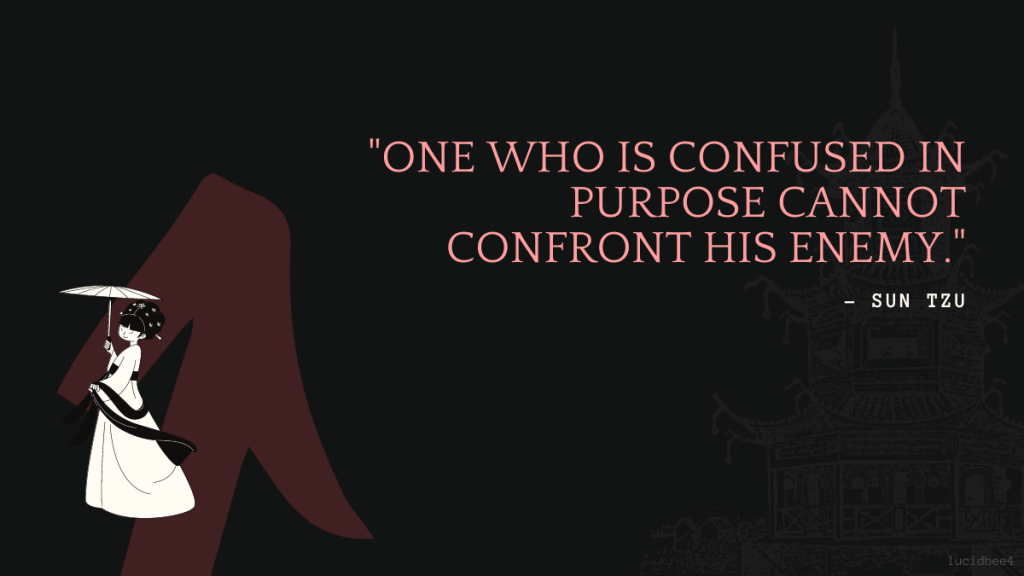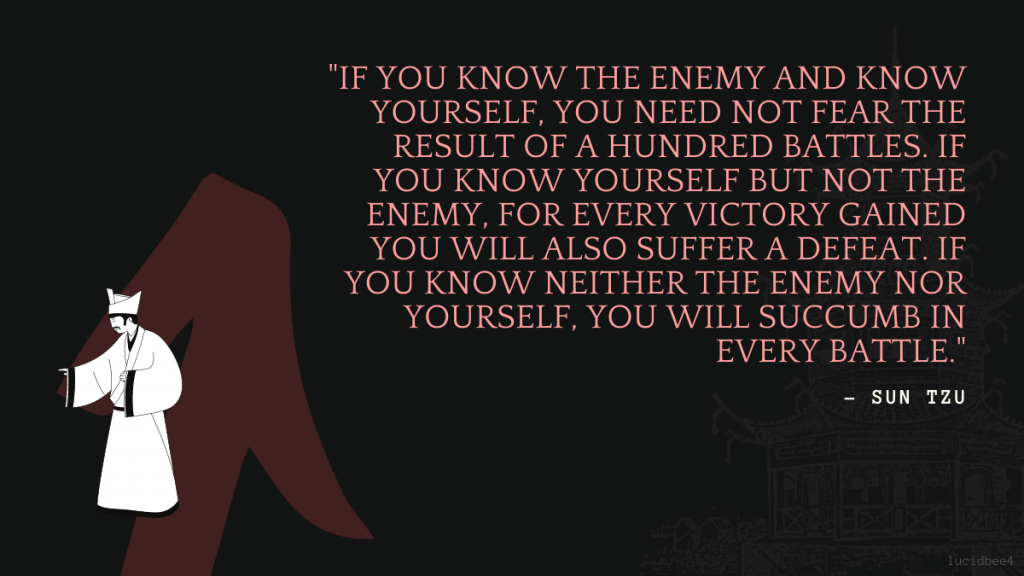The Art of War by Sun Tzu is in essence, based purely on Chinese military strategem and tactical thinking. This was introduced to me by Robert Greene, who based his book 48 Laws of Power around Sun Tzu’s work, as he was a military general – this book includes detailed outlines of using different weapons, terrains and supplies to your arsenal to conduct military operations, even upto the point where he mentioned optimal ratio of pikeman and horseman an army should have.

But Tzu was a Taoist as well, which I think is what made this book heavily influenced by Taoist philosophy and that’s what makes it applicable to other areas in life that’s why you see so many entrepreneurs and businessperson recommend people to read this book and are able to derive the meaning out of this ancient manuscript.
I wasn’t planning on reading it until I found myself in a place without much reading material except for this book, so I decided to go for it. While first reading, these strategies seemed very obvious and redundant to me and didn’t feel like there’s anything I can take away from this book but I figured I was taking this book too literally. Written in 5th century B.C – as dated as it is, if you take things that represented in their day, then the concept starts to hold valid, and you can make some sense out from it that way.
Take the chariot as an example; Recognize to see it as the primary source of mobility during that time then you’d be able to take away the tactics, and basically how you can use strategies like these to conquer real-life challenges. Times have changed, but the principles essentially remain the same.

From what I took away from this is the importance of taking an honest assessment of oneself, of our own strengths and weaknesses. One way to use this principle in your life is when you have an interview scheduled, you do your research on the company and leverage this information by figuring out how you can position yourself to become the person they need for the job.
Similarly if you know your purpose, your center: you would not take every negative thing people say about you personally. You know your wants and needs and are not just aimlessly running around looking for other people to define and stick their own label onto you, you’ve basically given yourself over to them. Which I found quite insightful because that’s what I tend to do and is a personal issue for me.
I know that to define is to limit oneself, but that shouldn’t mean that you don’t get to know yourself and self reflect your actions and why you do what you do. But there was also this point mentioned in here to become like water. It’s formless, which means that it can easily set itself into every shape but still got an identity of its own.
End Note:
Honestly, I quite enjoy these kind of books where you get to learn to become a badass by following strategical thinking and using psychology to your advantage and recognize when you’re getting played, but I want to mention that if you go through your life seeing people as enemies–being always paranoid about people’s intentions, your life is just going to suck ducks because you’ll be treating it as like a war field which can’t be good for your mental health. Just treat others the way you’d like to be treated and nothing can go wrong with that. Because it’s true that people are good at sniffing out forced concern and seeing through deceptions.
I have a hard time connecting these points to real-life scenarios. But it’s still quite fun to delve into these books especially when it’s quite old. Which can never cease to surprise me. That literature as old as this can provide you with such insights.
Notes from The Art Of War by Sun Tzu:
- Being too defensive is stupid, one must learn to take action but it must not be rushed.
- People listen to your action more than your words, but your words can be further reinforced by your actions.
- Victory and defeat can always be predicted before the battle is fought.
- It’s vital that you get to know your soldiers and be compassionate to them. (Get to know your team, to gain loyalty and trust and not alienate them from you)
- Avoid conflicts if it avoids great loss, defeat without fighting and pick your battles carefully, knowing which are waste of energy and resources and make sure the battles you fight are efficient. (Do not argue or fight over something which you know is useless and you can’t win over, avoid pointless arguments where you know the person is only focused on proving themselves right instead of being open to other people’s opinion, says basically to avoid the close-minded idiotás)
- Don’t destroy the opponents’ resources needlessly when you can use them in your arsenal, and don’t needlessly kill people when they can join your ranks.
- Master the skill of deception; when weak appear if you’re in control and vice versa.
- If enemy crosses river towards you, don’t confront them midstream but let half of the troops cross before striking.
- Balance and maintain inner peace when going to war, anger only helps your enemies to lure you so don’t be reckless but don’t be a coward either. Do not let other people provoke you or control your emotions.

